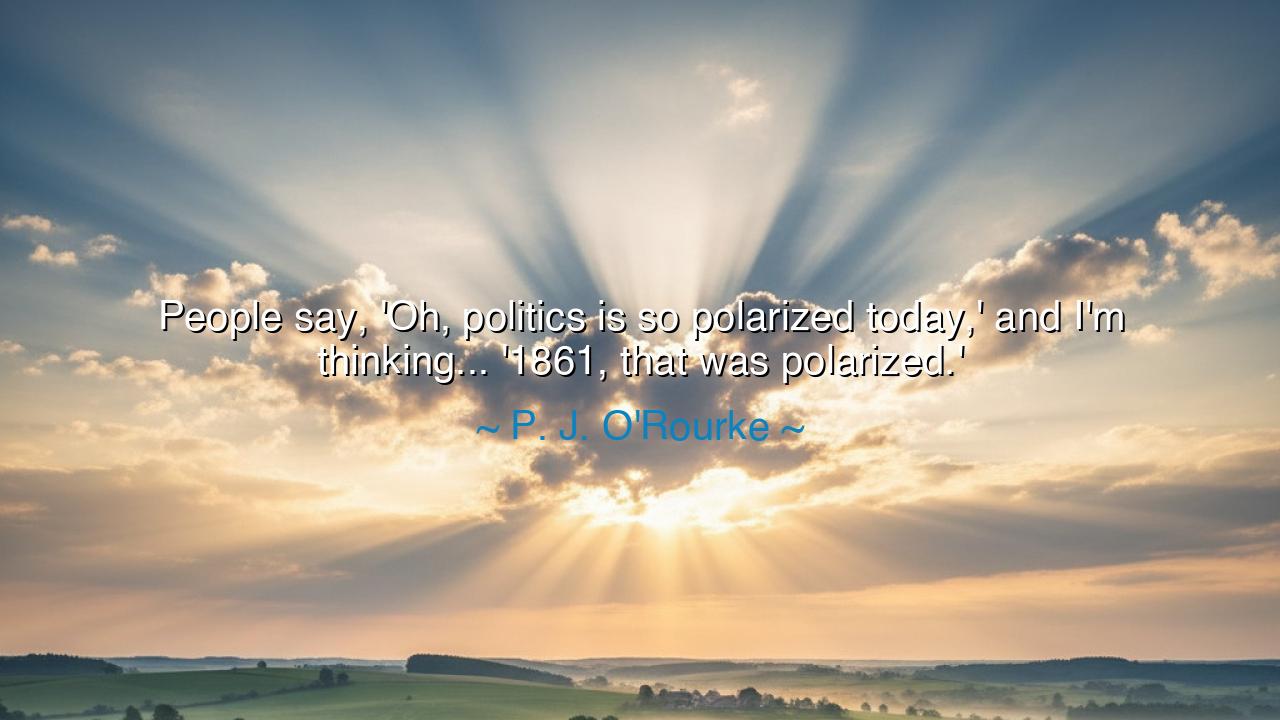
People say, 'Oh, politics is so polarized today,' and I'm
People say, 'Oh, politics is so polarized today,' and I'm thinking... '1861, that was polarized.'






"People say, 'Oh, politics is so polarized today,' and I’m thinking... '1861, that was polarized.'" Thus spoke P. J. O’Rourke, with irony sharpened into wisdom. His words remind us that what seems dire in the present must be measured against the fires of the past. Yes, division rends our age, but it is not the first time, nor the fiercest. The year 1861 was not merely disagreement—it was a nation split in two, a fracture so deep it summoned forth war, brother against brother, until the land itself was baptized in blood.
The ancients, too, saw that polarization can either sharpen debate or destroy civilizations. In the quarrels of Athens, the people’s factions grew so bitter that truth was lost, and demagogues rose, feeding the flames until democracy faltered. Rome, divided by optimates and populares, descended from civic discord into civil war. O’Rourke’s wit points us to the same truth: that anger today, however sharp, pales when compared to the abyss of total rupture.
Consider the example of America’s Civil War. In that year of 1861, compromise failed, trust collapsed, and the bonds of union snapped. Disagreements over slavery, sovereignty, and survival erupted into battlefields where hundreds of thousands perished. That was the true face of polarization: not angry words, not bitter campaigns, but cannon fire at Fort Sumter, and rivers of blood at Antietam and Gettysburg.
Yet from that fire arose lessons for the generations. Abraham Lincoln, though surrounded by hatred, called for unity, mercy, and the binding up of wounds. He knew that the cost of division is too high for any nation to bear. His vision was forged by the flames of polarization, teaching that even the deepest rifts must be healed, lest the house fall upon itself.
Therefore, let this wisdom be carried forward: do not mistake today’s quarrels for the worst the world has known, nor believe that anger alone is the end. History has shown us deeper divides and heavier prices. To call our age polarized is not false, but to remember 1861 is to gain perspective. Let us take heed: the path of unchecked division leads not to victory of one side, but to the ruin of both. True wisdom is to debate fiercely, yet hold fast the bonds of brotherhood, lest we repeat the darkness of the past.






HTnguyen thi huyen trang
O'Rourke’s comment about historical polarization makes me wonder if we’ve lost perspective on how far we’ve come in some ways. Sure, there’s still a lot of division today, but do you think the challenges of the past—like the Civil War—offer us lessons that can help today? How can we address current political divides without overestimating their severity, and learn to engage more constructively across differences?
DKDinh Duy Khang
I think O'Rourke is right to point out that polarization has been a long-standing issue. But does this mean we should just accept today’s divisions as ‘normal’? While 1861 was a time of extreme polarization, how much has society progressed in dealing with differing opinions and ideas? Are we learning from history, or is it all just repeating itself in a different form now?
UTUyen Trinh
It’s true that politics today often feels polarized, but O'Rourke’s comparison to 1861 brings an interesting point. Can we consider modern-day divisions to be on the same scale as those of the Civil War era, or is the complexity of today’s issues masking a different kind of polarization? Are we better equipped now to handle differences through discourse, or does the constant tension just make things worse?
THPham Tien Huy
O'Rourke’s comment really challenges the way we talk about polarization today. It made me think about how historical events, like the Civil War, were truly divisive in ways that are hard to compare to modern-day politics. But I do feel like our current political environment is deeply charged. Can we really compare it to the past, or are we living in a time of constant political stress that’s different in nature?
TNTuyet Nguyen
It’s fascinating to hear O'Rourke put today’s politics into perspective by comparing it to the past. I agree that historical polarization, like in 1861, was much more extreme. But do you think the way we engage with politics today—through social media and 24-hour news cycles—makes our current divisions seem worse than they actually are? Could it be that we’re hyper-focused on today’s issues, ignoring the bigger picture?